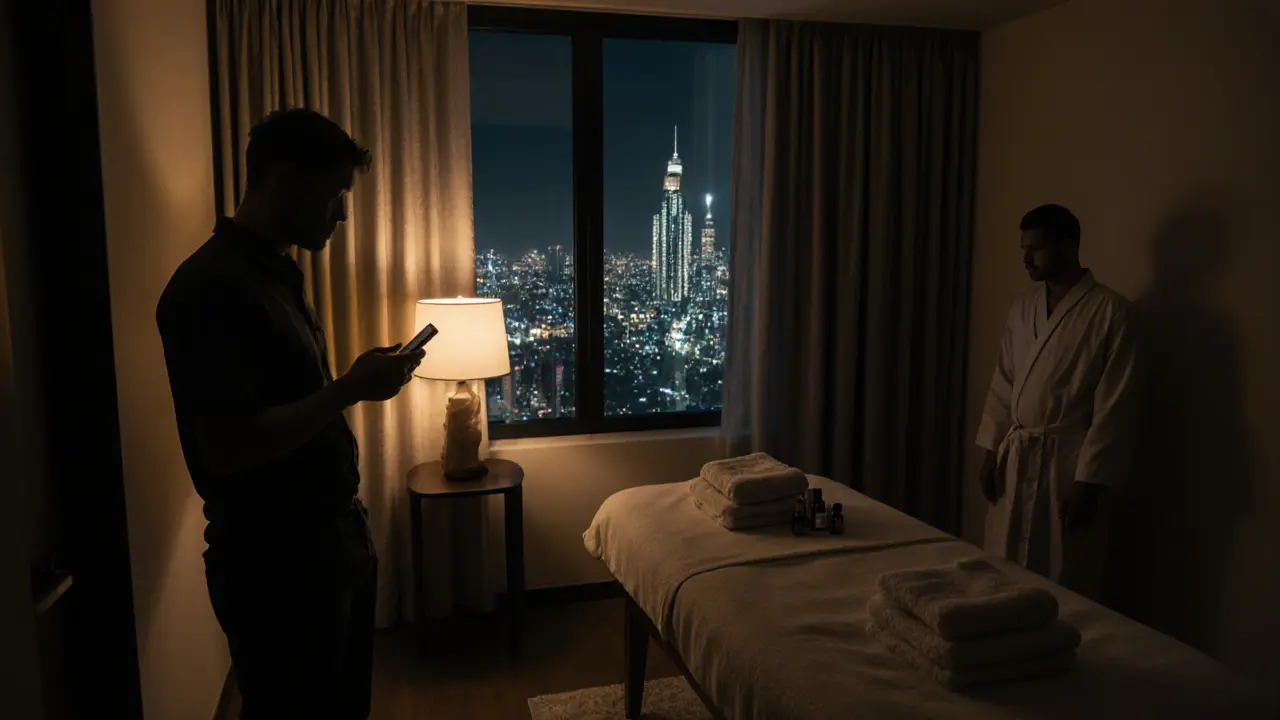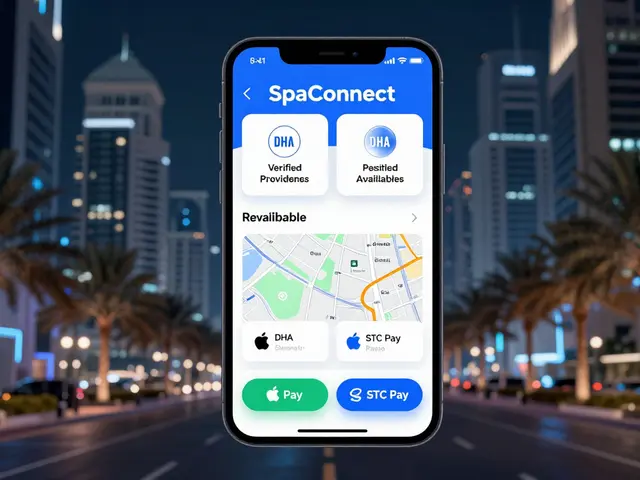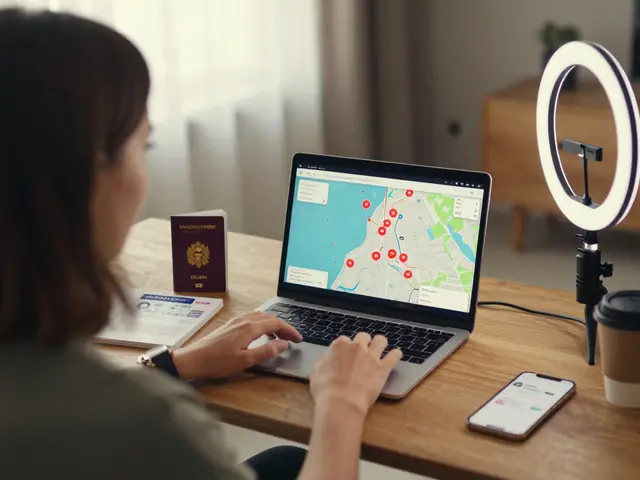Sex massage services in Dubai don’t exist legally - but they do exist, quietly, and they make money. Not because they’re sanctioned, but because demand never sleeps, and profit finds a way. This isn’t about tourism brochures or luxury spas. This is about underground networks, risk-reward calculations, and the economic reality of a city built on strict laws but flexible human behavior.
What You’re Really Paying For
When someone books a "relaxation massage" in Dubai for $200, they’re not paying for aromatherapy oils or Swedish strokes. They’re paying for discretion, access, and the absence of consequences. The service itself - physical touch beyond what’s allowed in licensed spas - is a small part of the cost. The real price tag covers the risk: the landlord who turns a blind eye, the driver who picks up the client without asking questions, the cleaner who wipes down the room after, the security guard who looks the other way for a few hundred dirhams.
Think of it like buying a bottle of wine in a dry country. You’re not paying for the grapes. You’re paying for the bypass.
The Supply Side: Who Provides These Services?
The workforce is almost entirely made up of foreign workers - mostly from Southeast Asia, Eastern Europe, and Africa - on tourist or domestic worker visas. Few have legal work permits for anything resembling adult services. Many are in debt from recruitment fees paid to agencies back home, sometimes tens of thousands of dollars. A single high-paying client can wipe out months of debt. That’s the incentive.
These workers aren’t running independent businesses. They’re nodes in a network. A middleman - often a former worker or a local fixer - connects them to clients. The middleman takes 30% to 50% of each transaction. The rest goes to the provider, who may share a room with others, work 12-hour days, and never know who’s coming next.
There are no contracts. No benefits. No safety nets. If the police raid a location, the provider disappears. The middleman reappears in another neighborhood. The client walks away with no trace.
Operating Costs: The Hidden Ledger
Let’s break down the real expenses of running an underground sex massage operation in Dubai:
- Rent: $1,500-$3,000/month for a small apartment in a residential building. Landlords demand cash, no paperwork. Some charge extra if tenants change often.
- Utilities: Electricity, water, internet - often paid under a fake tenant name. Power cuts are common when complaints are made.
- Security: A local fixer who handles "noise complaints," police bribes, or neighbor interference. Costs $500-$1,000/month.
- Marketing: No Google Ads. No Instagram. Clients come through WhatsApp groups, encrypted Telegram channels, or word-of-mouth referrals from other clients. A referral bonus of $20-$50 per new customer is standard.
- Supplies: Lubes, towels, condoms, cleaning products - $200-$400/month per location.
- Legal risk: No one puts this on a spreadsheet, but it’s the biggest cost. Arrests mean deportation, fines up to $27,000, and a permanent ban from the UAE. Some workers have been jailed for months before being deported.
Net profit per provider? If they see 15 clients a week at $150-$250 each, gross revenue is $2,250-$3,750. After middleman cuts and expenses, take-home is $800-$1,500. That’s more than double the minimum wage in Dubai - but it’s not a job. It’s survival with a ticking clock.
Why Dubai? The Demand Engine
Dubai isn’t unique in having underground adult services. But it’s uniquely positioned. It attracts millions of visitors every year - business travelers, tourists, expats - many from countries where sexual services are taboo or illegal. For them, Dubai feels like a loophole.
There’s also a large expat population - engineers, construction workers, nurses - who live here for years but can’t bring families due to visa rules. Loneliness, isolation, and lack of social outlets create steady demand. Some clients return monthly. They know the risks. They don’t care.
Unlike Las Vegas or Amsterdam, Dubai doesn’t have a visible red-light district. That’s intentional. The government wants to project a clean, modern image. But that invisibility doesn’t kill demand - it makes it more profitable. Scarcity drives prices up.

The Risk Premium: How the Market Prices Danger
In a legal market, prices reflect supply, demand, and overhead. In Dubai’s underground economy, prices also reflect risk. The higher the chance of arrest, the higher the price.
After a major police crackdown in 2023 - which led to over 120 arrests and 30 deportations - prices jumped 25% within weeks. Why? Fewer providers meant less supply. Clients knew the risk had gone up. They paid more to get what was now harder to find.
Providers responded by moving operations to more remote areas: villas in Dubai Hills, apartments in Jumeirah Village Circle, even private yachts anchored offshore. The cost of moving? Another $500-$1,000 per relocation. But the risk of detection dropped - and so did the chance of getting caught.
Who’s Really Making Money?
Not the providers. Not the clients. The real winners are the ones who never touch a client or get arrested.
Property managers who rent apartments to underground operators - often under false names - make steady income without legal exposure. Delivery drivers who bring food or supplies to these locations earn extra cash. Local fixers who negotiate with police or handle complaints become de facto regulators of the black market.
Even tech platforms benefit. WhatsApp groups and Telegram channels are used to coordinate bookings. These platforms don’t police content. They don’t need to. The service runs on anonymity, and anonymity keeps them safe.
The Human Cost: What’s Not on the Balance Sheet
Behind every transaction is a person. A woman from the Philippines who sends $800 home every month to pay for her sister’s surgery. A man from Ukraine who fled war and now works nights to afford rent. A teenager from Nigeria who was promised a modeling job and ended up in a Dubai apartment with no passport.
There are no labor protections. No healthcare. No mental health support. Many suffer from PTSD, depression, or addiction. Some try to leave. But leaving means losing their only income, facing deportation, and returning home with shame or debt.
The economy of sex massage in Dubai doesn’t just trade in services. It trades in desperation.

What Happens When the Crackdown Comes?
Dubai’s authorities don’t shut down these services permanently. They cycle. One month, there’s a sweep. The next, things return to normal. Why? Because the system is too profitable to kill - and too politically inconvenient to fix.
Shutting down the entire underground economy would mean exposing the scale of exploitation, the failure of visa systems, and the complicity of landlords and middlemen. It would mean admitting that Dubai’s image of purity is built on silence.
So instead, they do targeted raids. Enough to look like they’re in control. Not enough to break the system.
Is There a Legal Alternative?
There’s no legal sex massage in Dubai. But there are legal alternatives - and they’re growing.
High-end wellness centers now offer "therapeutic touch" services with licensed massage therapists trained in deep tissue, reflexology, and relaxation techniques. These are legit, regulated, and priced between $100 and $250. They’re marketed as stress relief, not sexual release.
Some clients who used to seek underground services are switching. Not because they suddenly care about legality - but because the risk isn’t worth it anymore. And the quality of legal services has improved.
It’s not the same. But for some, it’s enough.
The Future: Tighter Controls or More Innovation?
Dubai is investing heavily in AI surveillance, facial recognition, and digital monitoring of private residences. Apps that once allowed discreet bookings are being shut down. WhatsApp groups are being infiltrated.
But innovation follows. New operators use encrypted blockchain-based messaging apps. Payments are made in cryptocurrency. Locations rotate daily. Providers use burner phones and fake IDs.
The arms race continues. The demand hasn’t changed. The risk has gone up. The profit margin? Still strong.
Until the laws change - or the culture shifts - this economy will keep running. Not because it’s right. But because it works.
Is sex massage legal in Dubai?
No, sex massage is illegal in Dubai. Any service involving sexual contact, even if implied or requested, violates UAE law. Licensed spas are strictly regulated and only permitted to offer non-sexual therapeutic massage. Violations can lead to fines, imprisonment, and deportation for foreign workers.
How do people find underground sex massage services in Dubai?
Clients typically find services through private WhatsApp groups, encrypted Telegram channels, or referrals from trusted contacts. Online platforms are rare due to government monitoring. Word-of-mouth is the most reliable method. Providers rarely advertise publicly.
Who provides these services, and what are their backgrounds?
Most providers are foreign workers on tourist, domestic, or student visas - primarily from the Philippines, Ukraine, Nigeria, and Nepal. Many are in debt from recruitment fees and see this work as a way to pay it off quickly. Few have legal work rights for adult services, and most operate under extreme personal risk.
How much do providers actually earn?
After paying middlemen (30-50% cut), rent, utilities, and bribes, providers typically take home $800-$1,500 per month from 15-20 clients. This is significantly higher than minimum wage in Dubai, but comes with extreme risk, no benefits, and no job security.
Why hasn’t Dubai shut down this industry completely?
Shutting it down completely would expose systemic failures - including visa exploitation, landlord complicity, and the scale of demand from expats and tourists. Authorities conduct targeted raids to maintain the appearance of control, but full eradication would create political and social backlash. The system persists because it’s profitable and politically inconvenient to eliminate.




